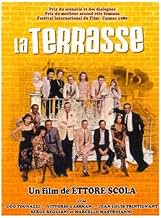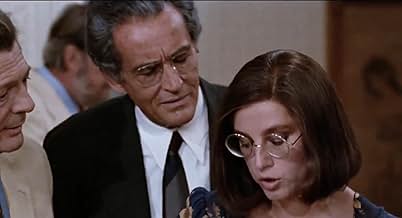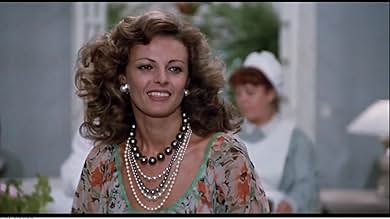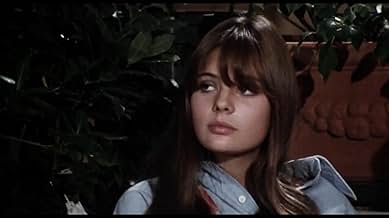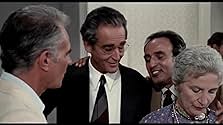AVALIAÇÃO DA IMDb
7,1/10
2 mil
SUA AVALIAÇÃO
Adicionar um enredo no seu idiomaDuring a dinner in a Roman terrace, the lives and experiences of multiple characters intertwine.During a dinner in a Roman terrace, the lives and experiences of multiple characters intertwine.During a dinner in a Roman terrace, the lives and experiences of multiple characters intertwine.
- Direção
- Roteiristas
- Artistas
- Prêmios
- 5 vitórias e 1 indicação no total
Jean-Louis Trintignant
- Enrico D'Orsi
- (as Jean Louis Trintignant)
Agenore Incrocci
- Vittorio
- (as Age)
Leonardo Benvenuti
- Un ospite
- (as Leo Benvenuti)
- Director
- Roteiristas
- Elenco e equipe completos
- Produção, bilheteria e muito mais no IMDbPro
Avaliações em destaque
10beto-19
Adorable, intelligent and politic driven movie. The best Italian director ever commands great actors and conducts the audience through a journey of passionate and bitter fellows who dare to fight for their beliefs.
In La Terrazza there are some amazing speeches - which I don't recall exactly - about every human being's right to happiness and love.
Maybe I liked it so much because I'm already a big fan of Ettore Scola. I also recommend his masterpieces "C'eravamo Tanto Amati" (the best Victorio Gassman performance) and "La Cena" (the last Gassman appearance).
In La Terrazza there are some amazing speeches - which I don't recall exactly - about every human being's right to happiness and love.
Maybe I liked it so much because I'm already a big fan of Ettore Scola. I also recommend his masterpieces "C'eravamo Tanto Amati" (the best Victorio Gassman performance) and "La Cena" (the last Gassman appearance).
Horrible sound, horrible photography, horrible screenplay, horrible acting. It seems to be directed with the left foot. Miles and miles away from the masterpieces 'C'eravamo tanto amati' or 'Una giornata particolare'.
Too much ambitious as well as superficial. It tries to represent the moral and political defeat of a generation, but the characters are two-dimensional.
Very uncertain in the choice of style: naturalistic or grotesque? It would have been better to go with the grotesque, because this kind of naturalism is very depressing. Scola used a bunch of actors who have always played anti-naturalistic characters in the glorious years of Italian cinema, so they are poorly utilized.
I'm sure this film will be forgotten over time.
Too much ambitious as well as superficial. It tries to represent the moral and political defeat of a generation, but the characters are two-dimensional.
Very uncertain in the choice of style: naturalistic or grotesque? It would have been better to go with the grotesque, because this kind of naturalism is very depressing. Scola used a bunch of actors who have always played anti-naturalistic characters in the glorious years of Italian cinema, so they are poorly utilized.
I'm sure this film will be forgotten over time.
Commedia all'Italiana had pretty well run its course by the time Ettore Scola made this film but its dark humour, scathing social satire and colourful characters certainly qualify it as typical of that particular genre. One is hardly surprised as the award-winning script is by the redoubtable duo of Age and Scarpelli whilst the cast is headed by three of the greatest male practitioners of Italian comedy, namely Marcello Mastroianni, Vittorio Gassman and Ugo Tognazzi. The absent Alberto Sordi gets a mention! As a bonus there are beautifully observed portraits of a deranged writer by Jean Louis Trintignant and a depressed pen-pusher by Serge Reggiani. On the distaff side Stefania Sandrelli proves once again that she is more than just a pretty face by picking up a Nastro d'Argento for her performance as Gassman's lover and as Mastroianni's ex-wife the elegant Carla Gravina was recognised at Cannes.
Although not Scola's greatest this is still the work of a master film-maker, is eminently watchable and fully justifies its length. The inexorable passing of time with its painful regrets, the fragility of relationships and the frailties of humankind as depicted here cannot fail to strike a chord and we are furthermore treated to a level of artistry from the principals that belongs to a vanished era.
Although not Scola's greatest this is still the work of a master film-maker, is eminently watchable and fully justifies its length. The inexorable passing of time with its painful regrets, the fragility of relationships and the frailties of humankind as depicted here cannot fail to strike a chord and we are furthermore treated to a level of artistry from the principals that belongs to a vanished era.
The movie's status as a cult classic definitely makes sense to me now. It's a very satirical and thorough look at the italian elite of intellectuals and artists, all of them very narcissistic, pretentious, self-pitying, emotionally unstable, in a constant internal state of decay, brandishing political theory without actually applying it, fighting unsuccessfully against the world of the 80s and capitalism and profit. All the main characters are tragic, and their awareness of their own pathetic nature makes them even more unhappy. They're all men who use women or demand their attention and their love, they try to find happiness where it doesn't belong. The theme of the movie is the humorous existential loneliness of the self-aware bourgeoisie. I have some complaints, like the fact that the movie is a bit long for my taste, and some of the 5 episodes really drag. The actors are almost all pretty good, the final raging monologue of Mario is amazing. The humor holds up pretty well, and it's always interesting to see how an older generation of creatives saw themselves. Overall, not very digestible, but fine as an intellectual and thought provoking portrait of the 80s artlife.
"During the dinner sequences, it is like operating an ensemble piece on a dime, DP. De Santis adroitly interposes long takes among various characters, discreetly listens to their conversations, or follows the kerfuffles, but there are no Altmanesque flourishes, which can concatenate all the fluid movements into a delectable visual orchestra. Here, Scala is more keen on building the signs of the times than showing off his sleight of hand, and juggling between studio and location shooting, LA TERRAZZA is an oddity that looks old school but attempts to say something au courant (the self-reflection of a society burdened with bureaucracy, commercialism and hypocrisy), therefore, it feels often luxuriate in the inner circles' own woes and melancholia. It is so cruel to see Mastroianni's Luigi the journalist, gets a cold shoulder from a young girl, the erstwhile Italian dreamboat now has been reduced to a gabby uncle figure that is so detached from the younger generation (a metaphor of Italian cinema's glorious days are on the ineluctable wane)."
keep reading my review on my blog: cinema omnivore, thanks
keep reading my review on my blog: cinema omnivore, thanks
Você sabia?
- CuriosidadesSerge Reggiani's character in the movie Is producing a TV adaptation of Théopile Gautier's famous novel "The Captain Fracasse";10 years later, director Ettore Scola will make a movie adaptation of the same novel, titled "CAPTAIN FRACASSA'S JOURNEY"
- Citações
[repeated line]
Hostess at 15° PCI's Congress: Dinner is served. Come!
- ConexõesFeatured in La strana coppia. Incontro con Age e Scarpelli (2001)
- Trilhas sonorasConcerto N.8 in La Minore
by Antonio Vivaldi
Principais escolhas
Faça login para avaliar e ver a lista de recomendações personalizadas
- How long is La terrazza?Fornecido pela Alexa
Detalhes
- Data de lançamento
- Países de origem
- Idioma
- Também conhecido como
- Die Terrasse
- Locações de filme
- Foro Piscario, Via della Tribuna di Campitelli, Roma, Lazio, Itália(Mario and Giovanna in the ruins of a Roman monument)
- Empresas de produção
- Consulte mais créditos da empresa na IMDbPro
- Tempo de duração
- 2 h 30 min(150 min)
- Mixagem de som
- Proporção
- 1.85 : 1
Contribua para esta página
Sugerir uma alteração ou adicionar conteúdo ausente

